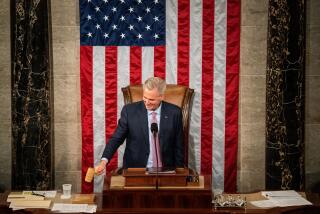COLUMN ONE : With Foley, Noble Era Will End : After three decades in the House, the gentlemanly Speaker from Spokane concedes defeat. The power of his post was no match for a public ready to hate the Congress that he loved.
- Share via
SPOKANE, Wash. — As the ink dries on this page of history, the story winds up with an exclamation point.
Thomas S. Foley concedes his seat.
The Democratic Speaker of the U.S. House of Representatives, only two heartbeats away from the presidency, came undone by a power greater than his: a scattered thousand or so swing voters who gambled their ballots on change.
When a sitting Speaker was last defeated for reelection, members rode to Congress in horse carriages and the shrub lands here were a territory, not even a state. To be exact, the year was 1862, and the nation worried for its future.
Back then, America was split North vs. South. A great debate raged over slavery.
Today, the nation is also divided, us vs. them--Americans vs. their government.
For this, Foley was the perfect target. He was a creature of the cloakroom. A 30-year man. He loved, respected and even rejoiced in government and most of all the institution of Congress. He refused the popular ploy of the modern politician and would not deign to portray himself as some sort of populist who was taking sides with “us” and against “them.”
So in this year when Congress itself went on trial, the 65-year-old Foley refused to cop a plea.
He was doing his job, he said, bringing home the bacon. He was proud of it. But 50%-plus of the residents here on the eastern border of Washington state said the smell was getting rancid.
It was fitting that his 5th Congressional District contest was one of the last to be decided--an exclamation point to the revolt of 1994. And indeed, the race is not officially over. Thousands of absentee ballots remain to be counted, and the margin is razor thin.
But not thin enough to sustain Foley’s hopes. At midmorning Wednesday, the aristocratic old war horse sat calmly at a table in his district office, joined by his wife and somber aides, and conceded.
What did he say?
What he always did--he defended Congress as a noble institution. “Despite what some people think, the overwhelming membership of the Congress, Republican and Democrat, are wonderful, upstanding, talented people who carry on the service of their constituents with honor and effectiveness.”
Further, Foley thanked the Presidents he served with, the late Richard Nixon and Lyndon B. Johnson, as well as Presidents Ford, Carter, Reagan, Bush and Clinton. All of them, he said, “sought to move our country forward. Men of honor and integrity. I have tried to give them my best service and counsel and assistance.”
And with his characteristic precision, Foley also noted that the final vote in his own race may not be announced for some days because Washington state residents can cast absentee ballots right up through Election Day. About 14,000 absentee votes remained to be tallied Wednesday.
“It appears to me that when all the votes are counted we may fall a few votes short,” he said. “So, there will be a somewhat prolonged counting of the absentee ballots. But if the final result is as it appears to be, the 5th Congressional District of Washington will have elected a new representative in Congress.”
Foley earlier telephoned to congratulate his challenger, George Nethercutt, a 50-year-old lawyer, civic activist, former U.S. Senate aide and onetime local GOP leader. For now, Nethercutt prepares to go to Washington as a sobering symbol of just how deeply Americans fear that political power has come to work against them, not for them.
“We need a listener, not a speaker,” Nethercutt said over and over during the campaign.
One can only imagine how such a slogan confounded Foley, who so painstakingly climbed the House’s seniority ladder from his first Capitol staff job in 1961 to his inaugural congressional victory in 1964. Over the years, he has been everything from a reformer to the target of reformers. But never an outsider.
Perhaps Foley would protest that any politician could be a listener but only one could be Speaker. And he might point to the wall in his Capitol office to the portraits of Henry Clay and Theodore Sedwick, both of them Speakers. How many men and women, he might ask, have passed through the chambers of the Capitol to be remembered as listeners?
In the 1960s, ‘70s, and ‘80s, this logic held sway. But in 1994, a listener in the Capitol seemed downright appealing.
It would be misleading to suggest that somehow voters in Spokane were stampeded by a catchy slogan.
All evidence shows that voters here knew what they were doing, and did it thoughtfully, almost reluctantly.
“Spokane is genuinely proud of Tom. This is not in any matter a personal vote against him. . . . It was a tide that swept the country,” said Justin Quackenbush, chief U.S. District Court judge for eastern Washington state and Foley’s friend for a generation.
This is a state and a region that have benefited enormously from its clout in Congress over the years: Military base closures happened elsewhere not here, electric rates were subsidized by taxpayers in other regions, the university grew fat on federal grants.
Foley’s district twice in the recent past voted against term limits. The Speaker had reasoned with voters that some other state without term limits would gain seniority, and thus power, at their expense. Why, Californians might use their power in Congress to divert Washington’s water during a drought, he warned.
An exit poll conducted Tuesday by Voters News Service asked whether residents in Foley’s district believed they would be better off if Congress were composed of all new people. By 2 to 1, they said no.
None of that, however, was good enough for a 16th term for the man first in rank and 11th in seniority in the House of Representatives.
“It is clear there is a sense on the part of Americans across the country that they are dissatisfied with the pace of change,” Foley said.
According to the exit poll, nine of 10 Democrats voted for Foley and nine of 10 Republicans voted for Nethercutt. On the streets of Spokane, it was apparent that the “swing voters”--the 20% of the electorate who decide elections in this district--found their decision Tuesday uncommonly difficult. Few shared the rebellious certainty sounded by GOP partisans across the country.
By turning out a congressional leader, attorney Dave Gumaer acknowledged, “we give up a lot. But the federal government today is in a feeding frenzy. Look at Sen. (Robert C.) Byrd (D-W.Va.). He probably brings home more for his state than anybody. Foley was the same way. . . . Maybe I’m being idealistic, but we shouldn’t be focusing on ourselves but the collective good. Isn’t that what democracy is?”
Gumaer voted for Nethercutt. Fellow attorney Tim Mangram considered the same situation and went for Foley in “one of those last-minute decisions.”
“Foley has done a lot for the district. . . . I just know now the district is going to suffer.”
Although the Foley-Nethercutt campaign had tinges of the dark streak of American campaign politics--negative advertising and special-interest intrusion--it never became a baited personality contest.
In that spirit it might be worth recording what the two men had to say about each other the day after the election--sentiments less cynical and more decent than usually credited to politicians.
“I know the thrill of election as well as the honor of service,” said Foley. He added that he and his wife “know the thrill that George Nethercutt and his family are experiencing today. . . . This new Congress and this new representative to Congress should have our support and our prayers.”
Said Nethercutt: “I’m deeply grateful to him and Mrs. Foley for being so gracious, for being such a good representative of this district for so long. He’s represented us with dignity, with great respectability. He is a fine person and so is his wife. . . . I wish there could be two winners. I feel that way sincerely.”
Conner reported from Spokane, Balzar from Seattle.
More to Read
Get the L.A. Times Politics newsletter
Deeply reported insights into legislation, politics and policy from Sacramento, Washington and beyond. In your inbox three times per week.
You may occasionally receive promotional content from the Los Angeles Times.










